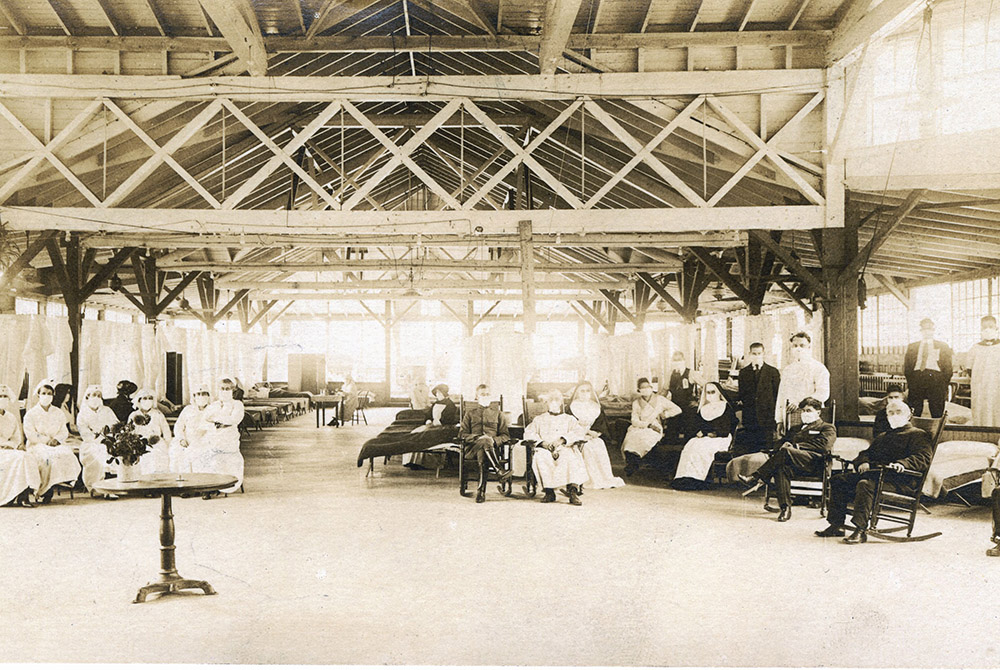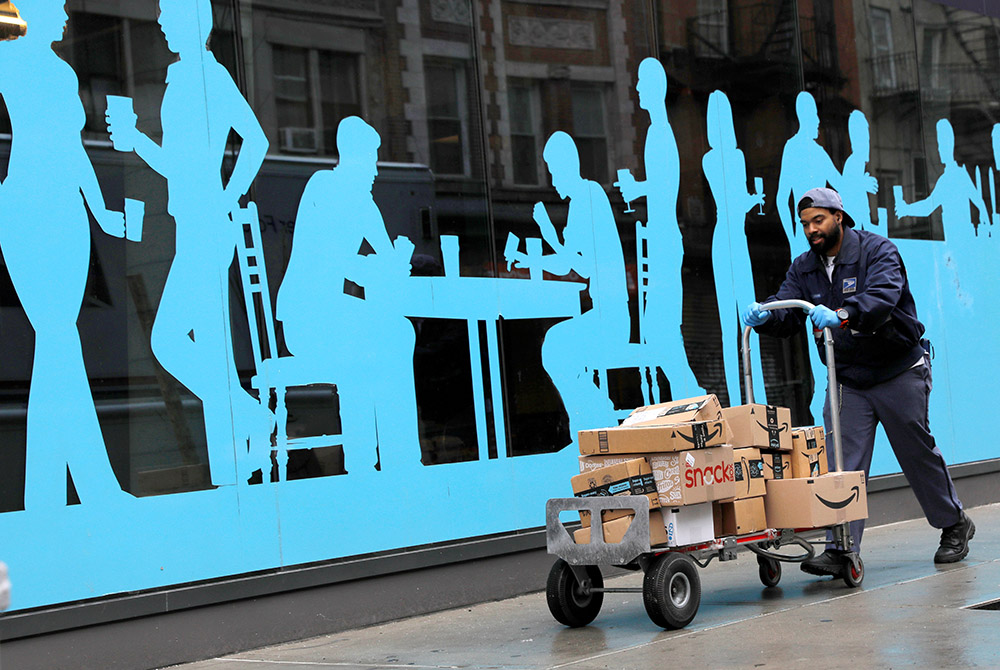
Members of the Sisters of Charity of New York, along with Sisters of Mercy and medical personnel, prepare for the arrival of patients at Edgewood Emergency Hospital in Shamokin, Pennsylvania, during the Spanish flu outbreak in October 1918. (CNS/courtesy Sisters of Charity of New York)
Pierre Teilhard de Chardin's prayer, "Patient Trust," is really a blessing on the anxious and impatient — in other words, all of us in this moment in time. He encourages us to trust "in the slow work of God;" in our evolution and development. He reminds us that we cannot "be today what time (that is to say, grace and circumstances acting on your own good will) will make of you tomorrow." Many are anxious now because they believe they are not capable of doing or being what this coronavirus pandemic seems to be requiring of humanity.
If you ask people how they got through very difficult periods of their lives, how they survived, they do not give you a careful accounting of a formula for resilience. And they do not pretend that they did not suffer. Rather, they say something about the practical things they did to adapt. They may add, "I don't know, really." What is true is that the person they were before that struggle could not have imagined getting through as they did. And the person they have become is a different, more complex, and most often, more resilient person than they could have previously imagined being.
Facing this pandemic and what it may require of us seems unimaginable because it is so unfamiliar. But it is important to remember that severe threat, duress, sacrifice, deprivation and loss are not unfamiliar to the human condition. Even more important to contemplate is that there is no reason to expect that we are made of something different than our ancestors. In fact, America is built on and from the stories of millions of peoples adapting to difficult circumstances in their home countries, thinking creatively through their suffering, changing whatever they could of their situations, and making the best out of what they could not change.
I have never walked a tightrope, but I can imagine that if I tried and started out my first steps by looking 30 feet out and 50 feet down, I might faint and fall. Rather, my best chances for survival would be to quickly survey the larger outlook and then put my head down and focus on what is directly in front of me. It is only step by step that I could get to the other side, breathing, focusing, paying attention to my body, talking to myself in encouraging ways, refusing to panic.
Soon-to-be mothers have no idea how an entire human body will pass through what is usually a very small space. It creates fear for many to simply imagine. But a process happens, a very painful one for sure, that allows the impossible to become possible. Part of that process, one of the stages of labor, when pain is at its height, is that the mother may become very quiet, interior, focused. She has one job to do and that is where she puts all her physical, mental and spiritual energy.

A U.S. Postal Service worker in New York City delivers packages during the coronavirus pandemic March 28. President Donald Trump extended the social distancing guidelines until April 30. (CNS/Andrew Kelly, Reuters)
The news will continue to confront us with predictions about how long this pandemic will go on, how many people will get sick and die, how many people will become unemployed, how deep the recession will be. That information is not useless. We do not want to bury our heads in the sand, nor stop caring for those who are truly suffering because of this. But that is not what is going to help us endure.
Human beings are wired to adapt. We have resilience built into us. And we are, in fact, stronger together. Resilience does not mean we are undisturbed or even unharmed. It means we are not defined by or limited to that which makes us suffer or struggle, to that which is aversive to us. We are bigger than our struggle. We are broader than our fears. We are deeper than the current moment. We are more adaptive than we know ourselves to be.
If the coronavirus has accomplished anything good so far, in the wake of its destructiveness, it is that it has reminded us of how connected and interdependent we are. And our response to it is not simply self-preservational, but also altruistic. While it is frightening, it is also quite beautiful that through "social distancing" we are actually spreading care. We are protecting the most vulnerable as well as ourselves and we are protecting our health care system so that it can protect us. Who among us would have imagined two weeks ago that we were capable of that?
Trying to imagine ourselves too far into the future is not adaptive for most of us because it is not how human beings work. Let the epidemiologists and economists do their jobs and advise us on how to adapt as the circumstances continue to evolve. Who we are today is different than who we were two weeks ago. And who we will be two months from now will be, likely, radically changed from who we are in this moment. Let us trust ourselves and each other that we too have what it takes to get through something very hard. As Theihard de Chardin observes, "it is the law of all progress that it is made by passing through some stages of instability."
Viktor Frankl, the famous Austrian psychiatrist who endured four years in Nazi concentration camps, observed that those who survived the camps best were those who continued to express their humanity by taking care of or reaching out to others, recognizing they were all in it together. That care can only be accessed by being present enough to see clearly what is before us and what is needed. We cannot access that presence of mind and heart if we are panicking about an unknown, distant future that we cannot control. We cannot get to the end of the tightrope by focusing on the destination. We cannot deliver the baby before the body is ready. We can only get there by focusing on what is in front of us, doing what we can, trusting that we have what it takes to adapt, and taking care of each other so we all get to the other side together. And if we can manage that, something miraculous will have been born.
[Eileen M. Russell is a clinical psychologist in private practice in New York and New Jersey.]
Advertisement







